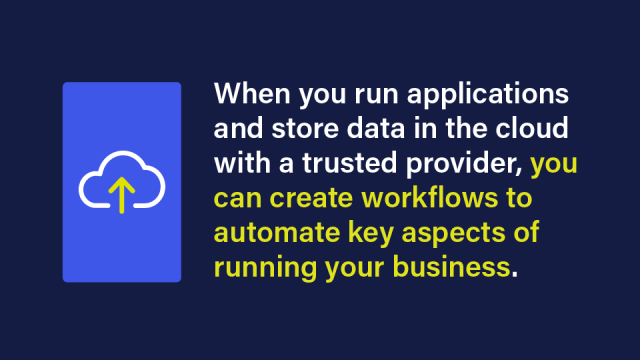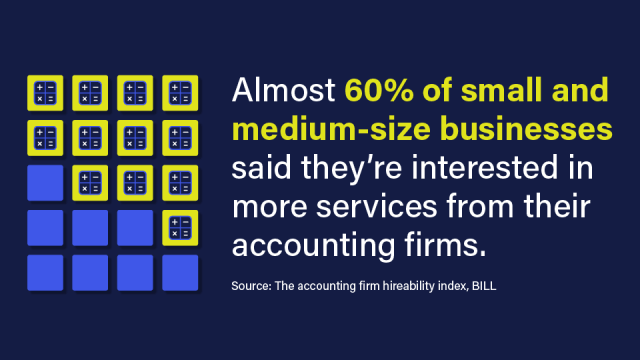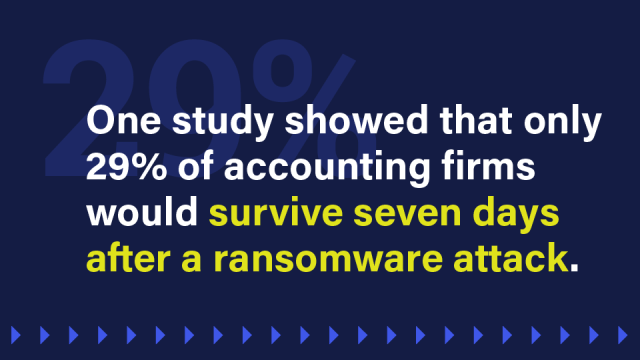Accounting services are likely to be increasingly in demand in the years to come, with the market for services growing far more rapidly than the number of accountants available to serve clients. The benefits of the cloud can help your firm manage what will be an inevitable period of growth.
More than a quarter of firms expect to grow by 10% or more in 2024. Almost 90% expect growth of some kind. The problem is that growth can be hard to handle. It can burden already stretched employees, necessitate the hiring of new employees and even affect the quality of your client services.
You can set your firm up to handle growth by running critical applications and storing data in the cloud. The initial benefits of the cloud are clear: anytime, anywhere access to critical files, secure data storage and automatic updates for key apps. But there’s more to working with a cloud partner than just those surface benefits.
In the cloud, your firm can improve client service, enabling you to drive revenue from existing accounts and take on new ones if you choose. And you can also more easily attract and retain employees.
You can leverage the benefits of the cloud to improve your business model

For some of your clients, paying your firm an hourly fee could be a deal-breaker. It’s hard for the client, and sometimes for you, to know how long your work will take to complete. Clients might not have a good idea of how much a service billed hourly might ultimately cost. The disconnect can be a barrier to growth—and an unnecessary annoyance for both the client and your firm.
Benefit No. 1: Automation
When you run applications and store data in the cloud with a trusted provider, you can create workflows to automate key aspects of running your business. Your cloud partner can, for instance, help you create an infrastructure that enables you to charge a retainer for a suite of services and implement a tiered support model. You can move away from the antiquated single-service, hourly billing setup.
Benefit No. 2: New advisory services
Using an advisory-focused model, you can offer new advisory services. And you can offer them, in part, by automating the time-consuming manual tasks that deliver minimal value to clients. In the cloud, you can free up the time and resources to switch from performing lower-value hourly tasks to offering value-based advisory services.
Benefit No. 3: Scaled operations
Developing and enhancing client services more quickly and efficiently enables your firm to grow by selling new services to clients you already have. If you do want to bring in new clients, the cloud can help there, too. One of the benefits of the cloud is the flexibility to easily scale your operation and deliver a wider variety of services.
In the cloud, better connections create ‘sticky’ clients

Aimee Engle understands the value of the cloud for her business. The founder and owner of AE Possibilities, which provides small business bookkeeping and QuickBooks® consulting services, focuses on building trust with clients to move beyond simply performing hourly tasks.
Engle often fields calls and pitches ideas on how prospective clients can use cloud-based applications tied into QuickBooks Desktop to solve larger problems for their businesses. Once she earns a level of trust, her prospective clients understand her value as a business advisor. The freedom that cloud-based services give her is critical to the success of her operation.
Small business clients have come to expect real-time service, which can be difficult to offer with traditional accounting technology. Clients want to access their information from your firm when they need it, not when you’re ready to give it to them. A cloud service enables you to share and work with data with clients in real time. There are no crossed emails or other delays.
Offering constant visibility helps you strengthen relationships with clients and ultimately leads to client retention for your firm. Sticky clients tend to demand more services. In fact, almost 60% of small and medium-sized businesses said they’re interested in more services from their accounting firms.
Leave cybersecurity concerns behind when you leverage the benefits of the cloud

With clients asking for more, growth is a fact of life for accounting firms. Some firms want to grow rapidly. Others just need to keep up with increased demand. Either way, firm leaders need to focus on running their firms instead of dealing with technology.
Cybersecurity is a particular concern; a single attack could destroy your firm. One study showed that only 29% of accounting firms would survive seven days after a ransomware attack.
But when you rely on a cloud service, you don’t have to worry about cybersecurity. Your cloud provider runs your apps and stores your data in enterprise-class data centers. Cybersecurity experts protect your firm around the clock. Plus, you no longer have to install or maintain applications or data yourself. Each of your cloud-connected devices becomes a terminal for access, no matter where it’s located.
Just as the cloud enables you to develop new services for clients, it also frees up employees to do more client prospecting and spend more time serving (and selling to) existing clients.
Hire employees anywhere there’s an internet connection

Finding and retaining employees is a challenge for many firms in an age when accountants are leaving the profession in large numbers. However, firms that run applications in the cloud have a major advantage. They can hire employees or contractors who aren’t in the firm’s geographical area.
That allows firm leaders to look nationwide for qualified candidates. Once employees come to the firm, they’re more likely to stay because the business runs applications in the cloud. With tasks like application security and updates outsourced, employees have more time to handle the work they want to perform. Plus, with cloud-based workflows in place, employees know who does what for clients. Processes are clear and unambiguous.
Employee experience is a major factor in staff retention. The ease of working in the cloud makes your firm more attractive to employees than companies that are still trying to manage critical applications themselves. And retaining employees is, of course, critical for the growth of your accounting firm.
The cloud also facilitates remote work, which is now simply part of the reality of running a business. Professional recruiters know. According to Alliance Virtual Offices, 64% say offering remote work lets them present higher-quality candidates to their clients. With the unemployment rate for accountants and auditors hovering around 1%, quality candidates tend to be few and far between. The cloud is a huge differentiator for firms in this area.
The cloud is the best place for growth
A cloud partner can offer a set of services to help you reach your goals for growth, including the capabilities you need to boost efficiency, ensure security and enable your firm to grow in a way that works for you. Growth is inevitable, but in the cloud, it doesn’t have to be painful.
Are you ready to get set up for growth? Get ready today.


